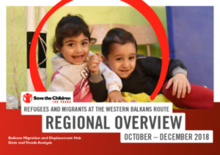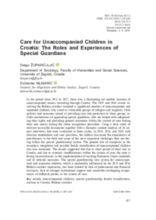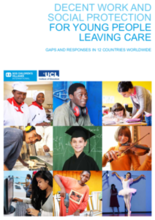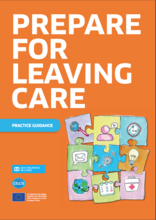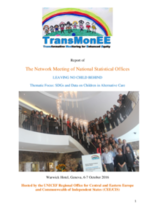Displaying 21 - 30 of 44
The purpose of this paper is to critically reflect on the conditions and context of deinstitutionalization and the process of transformation of the institutions for children with behavioural problems from several key aspects: current offer of treatment programs and interventions in institutions and communities, competences of professionals in transformation process, research related to needs and risks of children and education of future professionals.
The Croatian Ministry of Demography, Family and Youth Affairs, in collaboration with UNICEF and a civil society organization in the country, has launched a foster care campaign under the slogan "Every Child Needs a Family," according to this article from Total Croatia News.
This video shares the views of the Croatian partner's trainers, young people and care professionals involved in the "Prepare for Leaving Care" project training for care professionals.
The 2017 country factsheets provide an update on the status of child protection and care reforms from 16 European countries that are the focus of Opening Doors for Europe’s Children campaign in Phase II.
Data and Trend Analysis (DATA) Refugees and Migrants at the Western Balkans Route Regional Overview, covering period October - December 2018, describes key trends in migrations in the region, detailing information about the number of people on the move, demography (age, sex, country of origin, etc), behavioral patterns, and routes in use - with a focus on children, particularly unaccompanied children. Data in this report includes key trends in Bulgaria, North Macedonia, Serbia, Albania, Montenegro, Bosnia and Herzegovina, and Croatia.
Special guardians have been tasked with safeguarding the rights of unaccompanied minors in Croatia and providing general assistance within the system of care during their stay and/or during the status recognition procedure. The authors of this study discussed the experiences of practitioners in the field and some of the most important challenges they are facing within the special guardianship system.
The goal of the research is to gain insight into the challenges of foster care for children with behavioral problems from the perspective of experts and their suggestions for improving foster care, with the purpose of identifying guidelines for the development of specialized foster care and protecting the welfare of children with behavioral problems.
The aim of this report from SOS Children's Villages is to increase the knowledge and understanding of the needs and rights of young people ageing out of alternative care around the world, in order to inform strategies, policies and services to improve their life chances and outcomes through appropriate preparation for leaving care as well as after-care support.
This Practice Guidance, developed by SOS Children’s Villages International and CELCIS, seeks to promote improvements in practice that should have a positive impact for young people during and after the leaving care process. The contents of this Practice Guidance are in good part informed by a detailed Scoping exercise that was carried out in each of the five countries participating in this project: Croatia, Italy, Latvia, Lithuania and Spain.
This document summarizes the content of the 6-7 October 2016 Network Meeting of National Statistical Offices. The event comprised of a number of presentations on topics related to the SDGs and data on children in alternative care.

